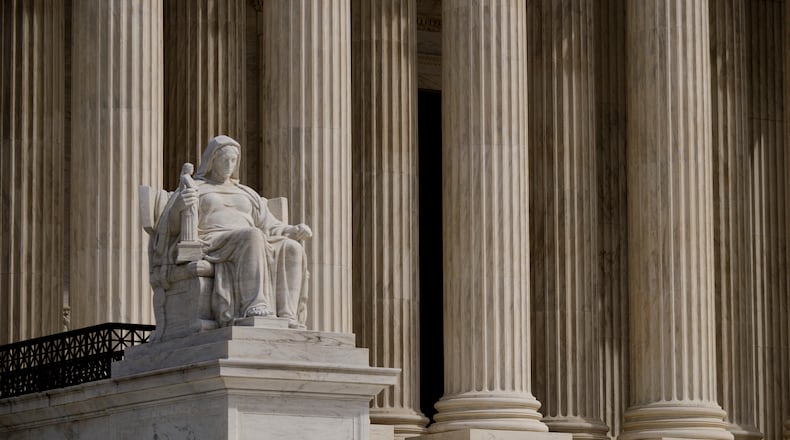Who owns the law in Georgia?
On Monday, the U.S. Supreme Court will take up that question as the justices consider whether the annotated version of Georgia code is protected under copyright law or should be made available to the public free of charge.
The hotly disputed case, pitting the state against an open records proponent, has caught the attention of the Trump administration, whose lawyers say Georgia’s code should be protected. At the same time, news media and civil rights organizations are also weighing in, contending the public should have unhindered access to the state code.
What is not in dispute is whether the laws enacted by the General Assembly can be subject to copyright protection — they can’t be. But the annotated code, essentially a reference guide filled with summaries of court decisions and legal writings, is a different matter altogether.
The case began four years ago when Georgia sued California-based public records activist Carl Malamud after he refused to stop publishing the annotated code on his Public.Resource.Org website. In October 2018, the federal appeals court in Atlanta ruled in Malamud's favor, finding the code cannot receive copyright protection.
“The people … are the source of our law” and that makes them the code’s “constructive authors,” the court said. “And because they are the authors, the people are the owners of these works, meaning that the works are intrinsically public domain material and, therefore, uncopyrightable.”
But Georgia appealed that decision to the nation's highest court and, in June, the justices agreed to hear it.
In its legal briefs, Georgia said a private contractor — not the Legislature — produces the annotated code, and this arrangement warrants copyright protection.
The making of the annotated code is overseen by a state commission composed of the speaker of the House, the lieutenant governor, eight lawmakers and five members of the State Bar. The commission contracts with LexisNexis, a data collection company, to prepare the code.
The work by LexisNexis is “resource- and time-intensive,” and the company bears the full cost of publishing the code, said the state of Georgia in its legal brief to the Supreme Court. In 2016, the state commission imposed price controls on the code, capping its cost at $404 for those who want to buy it. LexisNexis makes its money from the sales of the code.
The Trump administration, in its legal brief, said this is enough to protect the annotated code under copyright law. “The annotations were created by contractors and their employees, not legislators or their staffs,” wrote U.S. Solicitor General Noel Franscisco.
Numerous states rely on economic incentives to get companies such as LexisNexis to prepare and publish their annotated codes, said Josh Johnson, a University of Virginia law school lecturer who will argue the case Monday on Georgia’s behalf.
“If the (appeals court’s) decision is affirmed, publishers will no longer be able to rely on sales of copyrighted works to recoup their costs for preparing annotations,” said Johnson, also a Washington attorney. “Therefore, states will either need to use taxpayer dollars to pay the publishers or stop offering annotated versions of their official codes.”
Thirteen states and the District of Columbia offered similar sentiments in a legal brief filed with the high court.
In a statement emailed to The Atlanta Journal-Constitution, Malamud said the annotated code is issued under the authority of the state. The code, he said, represents “the official law of the state of Georgia” and even the secretary of state’s seal is affixed on each volume.
“This is an edict of government,” Malamud said. “We are hopeful the U.S. Supreme Court will reaffirm the long-standing principle of our democracy that the laws belong to the people and no private party can be granted a monopoly on speaking the law.”
Malamud’s case has received support in friend-of-the-court briefs filed by a wide variety of groups, including the American Library Association, the American Civil Liberties Union, the Intellectual Property Association and the Reporters Committee for Freedom of the Press, which was joined by Gannett Co., the Los Angeles Times and The New York Times.
“If the First Amendment requires public access to criminal trials so that citizens may oversee and participate in government, then citizens must also have access to the laws that organize their society (and that form the basis of those criminal trials),” the media organizations said.
About the Author
The Latest
Featured




